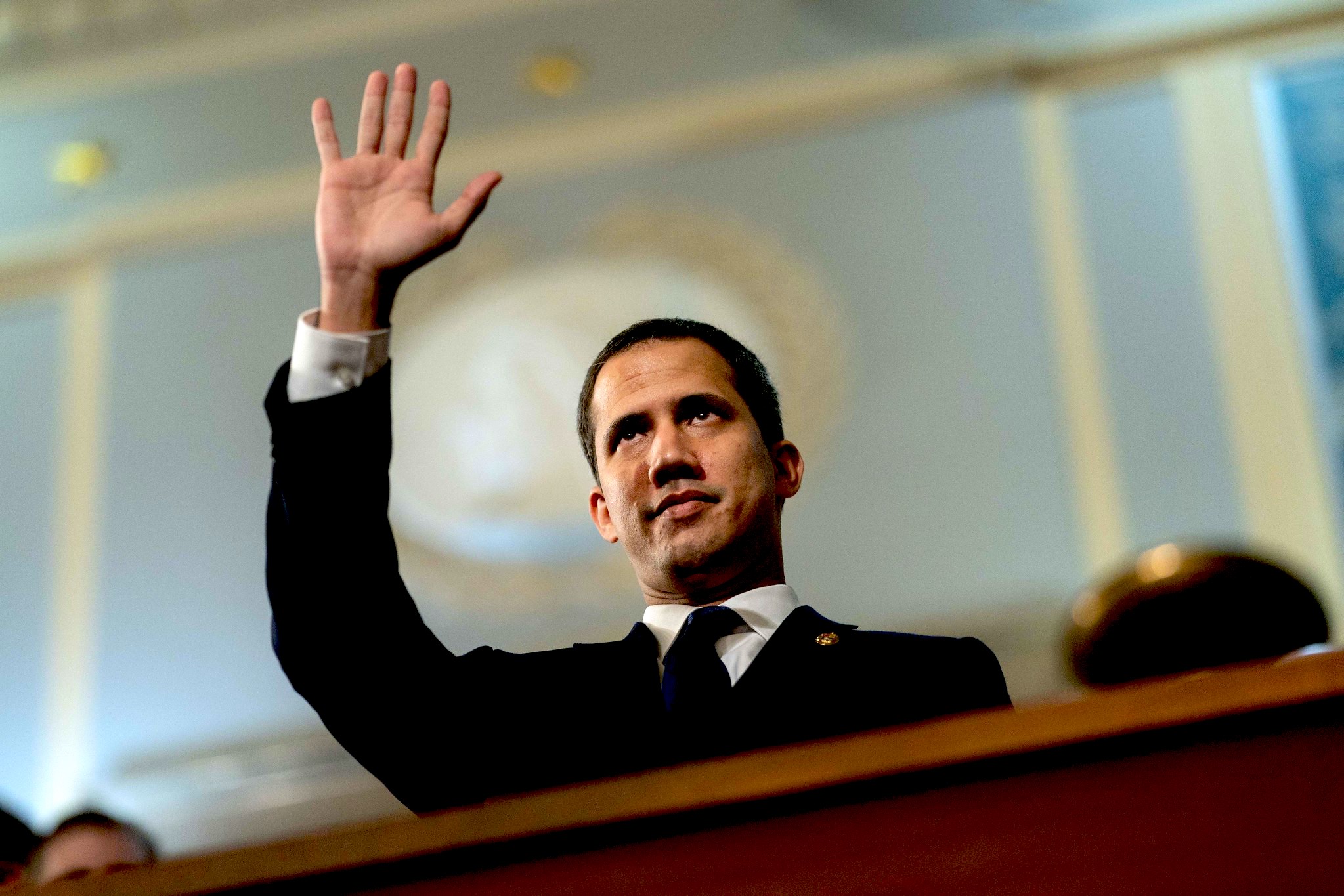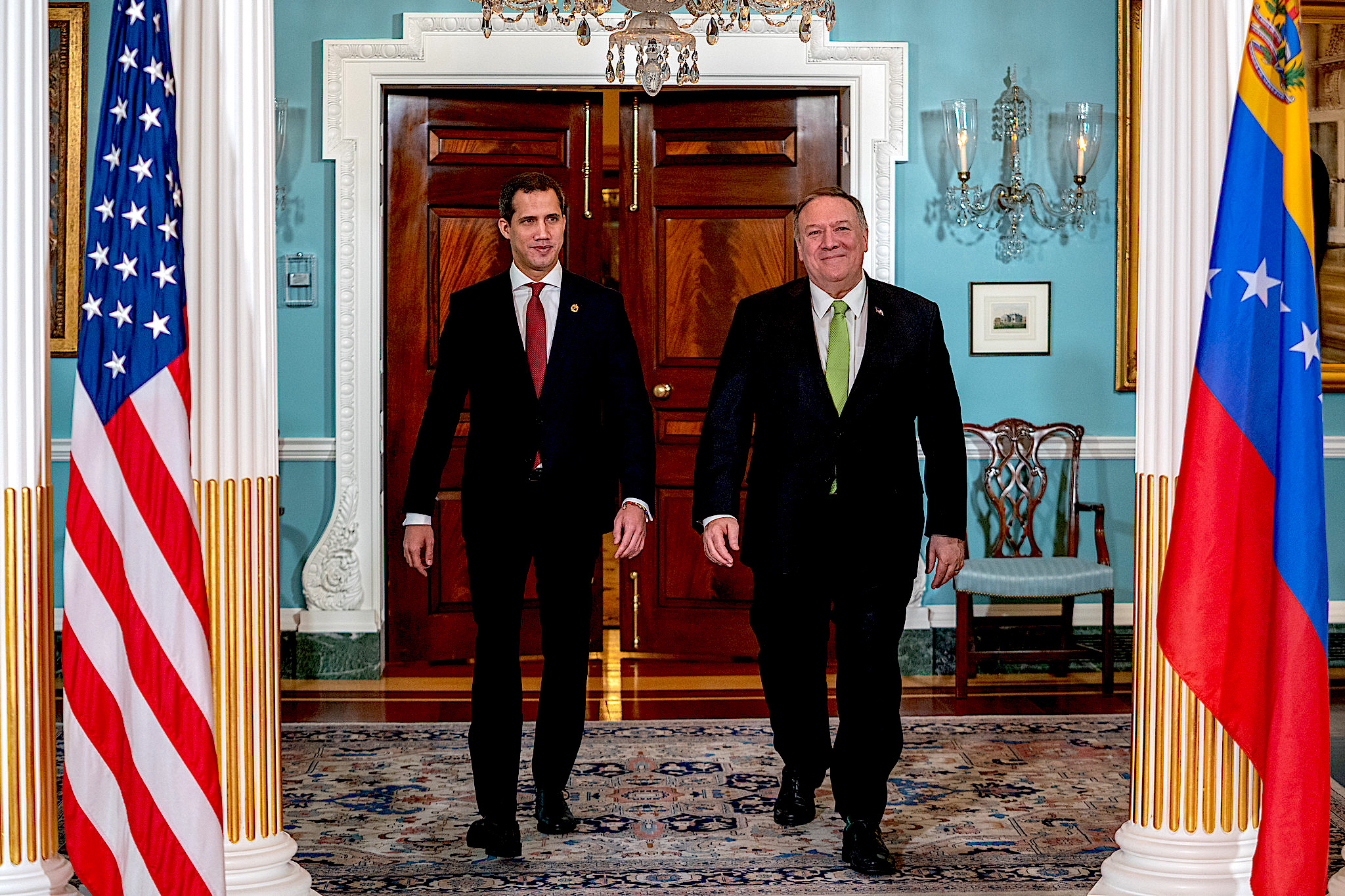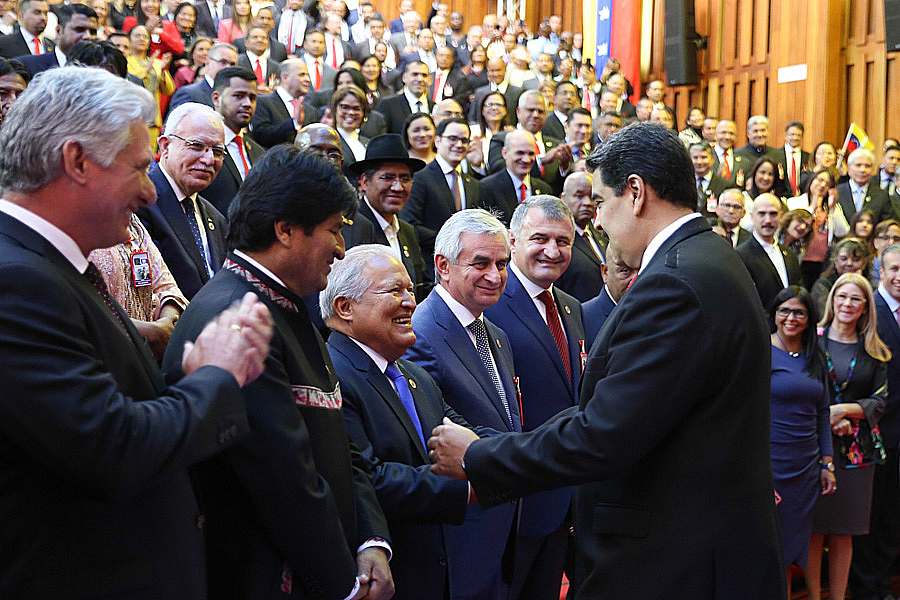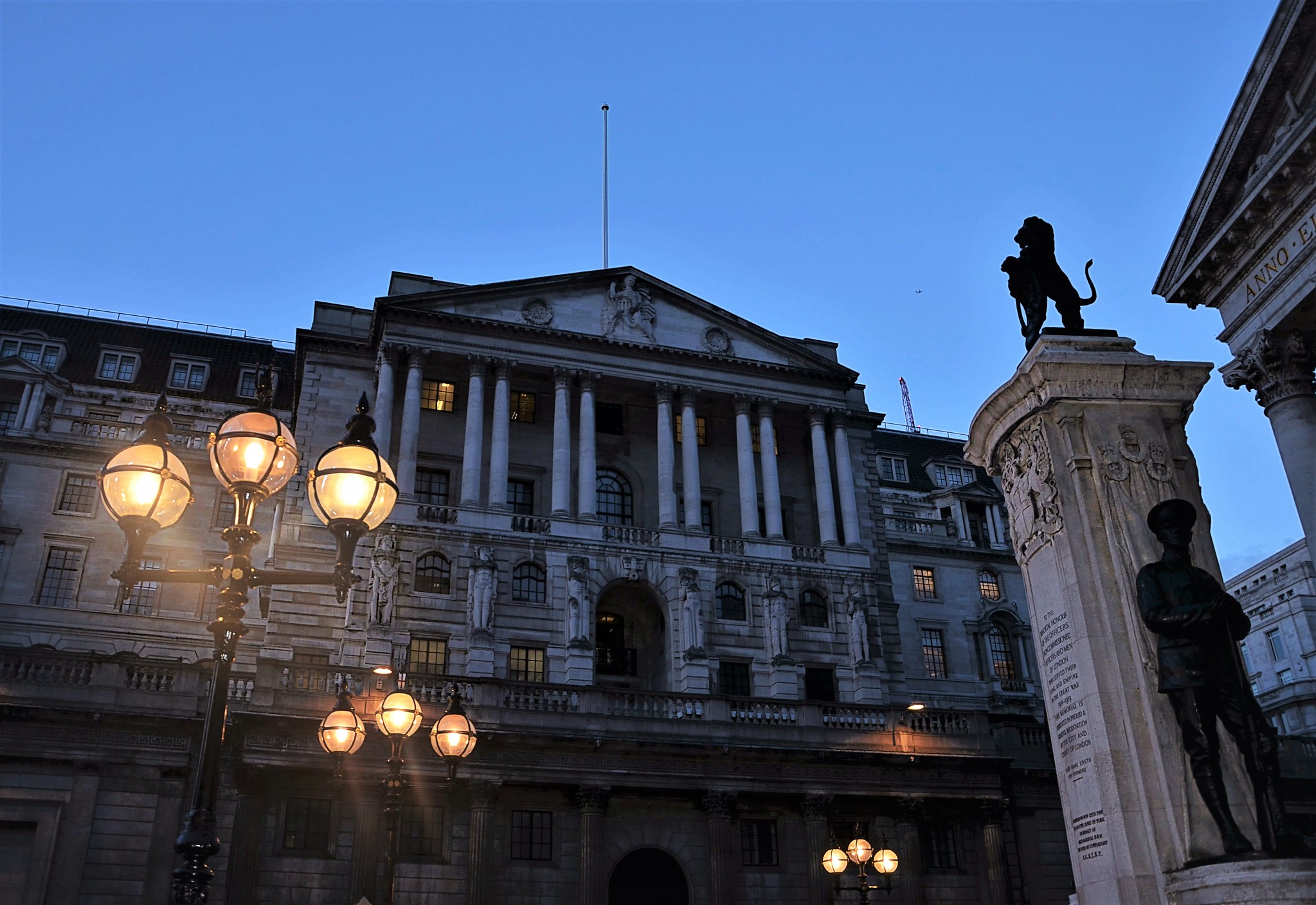Guaidó’s financial assistance from the Foreign Office undermines the government’s persistent claims that the case was not political and just a matter for the Bank of England and the courts, writes John McEvoy.

Feb. 4, 2020: Juan Guaidó after being recognized by President Donald Trump as the legitimate leader of Venezuela during the State of the Union address at the U.S. Capitol in Washington, D.C. (White House, D. Myles Cullen)
By John McEvoy
Declassified U.K.
 Britain’s Foreign Office spent £80,697 in public funds supporting Venezuelan opposition figure Juan Guaidó’s campaign to seize roughly $2 billion of gold held in the Bank of England, documents obtained by Declassified show.
Britain’s Foreign Office spent £80,697 in public funds supporting Venezuelan opposition figure Juan Guaidó’s campaign to seize roughly $2 billion of gold held in the Bank of England, documents obtained by Declassified show.
The data highlights the extent to which the U.K. government has assisted Guaidó’s efforts to access Venezuelan state assets, with the Foreign Office investing both political and financial capital into this case.
The U.K. Government Legal Department initially declined to provide this spending data, stating: “We will not comment further due to ongoing legal proceedings.”
However, the Foreign Office later released the data following a Freedom of Information request from Declassified.
Freezing Venezuela’s Gold
The Bank of England first refused to release Venezuela’s gold in 2018, citing doubts over the legitimacy of the Nicolás Maduro government, which has been in power since 2013.
Guaidó declared himself Venezuelan president in January 2019, using Article 233 of Venezuela’s constitution to argue that Maduro had abandoned his post and consequently left an “absolute vacuum of power.”
As head of Venezuela’s National Assembly, Guaidó claimed he was next in line to fill this vacuum.
The U.S. government moved quickly to recognise Guaidó and shore up international support for regime change in Venezuela. As former U.S. Secretary of State Mike Pompeo wrote, this was an opportunity to remove “a twenty-first-century violation of the Monroe Doctrine,” a policy which treats Latin America as Washington’s backyard.

Feb. 6, 2020: Juan Guaidó, left, with U.S. Secretary of State Michael Pompeo at the U.S. State Department. (State Department/Ron Przysucha)
With a coup in Venezuela now firmly on the cards, the U.K. government provided the Bank of England with “political air cover” to keep the gold frozen.
This came in the form of a “robust letter” from the Foreign Office to the Bank “outlining the growing doubts over Maduro’s legitimacy,” according to the recently published diaries of former minister Alan Duncan.
The Trump administration’s hostility to Maduro apparently weighed heavily on Britain’s decision-making process.
According to former U.S. National Security Advisor John Bolton, then U.K. Foreign Secretary Jeremy Hunt was “delighted” to help Washington’s destabilisation campaign, “for example freezing Venezuelan gold deposits in the Bank of England.”
Legal Battle
On 4 February 2019, the U.K. government formally recognised Guaidó, triggering a protracted legal battle over who could lay claim to the gold.
The legal process centred on whether the U.K.’s stated recognition of Guaidó allowed it to transfer Venezuelan state assets to his “interim” government.
Throughout this case, the U.K. government insisted at every turn that it recognised Guaidó — and not Maduro ‚ as Venezuelan president. In turn, Guaidó’s lawyers argued that he was authorised to represent and control the assets of the Venezuelan Central Bank in London.
In 2021, for instance, the U.K. government acquired the services of Sir James Eadie QC and Jason Pobjoy (of Blackstone Chambers) and Sir Michael Wood and Belinda McRae (of Twenty Essex) — some of the U.K.’s top lawyers — to present its case in support of recognition of Guaidó.
At the Supreme Court, these lawyers argued on behalf of the U.K. foreign secretary that Britain’s recognition of Guaidó was “clear and not ambiguous.”
The implication of this argument was that the U.K. government could treat Guaidó for all intents and purposes as Venezuela’s president and that Venezuela’s gold reserves could thus be transferred to Guaidó and his representatives.

Foreign leaders greeting Venezuelan President Nicolas Maduro at his second inauguration, Jan. 10, 2019. (Presidencia El Salvador CC0, Wikimedia Commons)
Professor Francisco Rodríguez is a leading Venezuelan economist who has advised its National Assembly on financial matters and currently teaches at the University of Denver.
He told Declassified: “Despite a long-established legal and diplomatic tradition that recognition is only granted to governments with actual control over a country’s territory, the British government went out of its way to make a convoluted case before courts that it was recognizing the Guaidó interim government even though it was not engaging with it diplomatically.”
He added:
“In contrast to the United States, the U.K. maintained an embassy in Caracas and interacted with the Maduro-appointed ambassador, refusing to accept credentials from Guaidó-appointed diplomats. In principle, these decisions would in and of themselves have implied unequivocal recognition of the Maduro government.
However, the U.K. insisted before the Supreme Court that it recognized Guaidó as Venezuela’s president, an argument that had as its only practical effect the blocking of the Venezuelan Central Bank’s access to part of its international reserves.”
‘Nothing to Do with This Government’
The Foreign Office’s use of public funds to support Guaidó in court casts serious doubt on the government’s persistent claims that the gold case was not a political affair but a matter for the Bank of England and the courts.
In February 2019, Duncan declared in Parliament that the freezing of Venezuela’s gold reserves “is entirely down to the Bank, as an independent Bank of England.”
He added: “It is nothing to do with this government. We are not empowered to, nor should we in any way attempt to, influence the decision of the Bank of England.”

Bank of England in London. (It’s No Game. Flickr, CC BY 2.0)
Shortly after, Treasury Minister Robert Jenrick affirmed in a similar vein that: “Holding gold reserves on behalf of any foreign central bank is a matter for the Bank of England.”
However, the politicised nature of this case seems difficult to ignore. Indeed, the U.K. government’s recognition of Guaidó was a key prerequisite for the Bank of England’s refusal to release Venezuela’s gold.
The U.K. also has long-standing oil interests in Venezuela. In February 2020, a secretive Foreign Office team named the “Venezuela Reconstruction Unit” met in Caracas to discuss “U.K. involvement in the energy sector of Venezuela.”
Britain’s decision to freeze Venezuela’s gold thus formed part of a wider effort to remove the Maduro government and reassert Western domination over its key industries.
The data obtained by Declassified will make it increasingly difficult for the U.K. government to counter claims that the gold case has been political at its core.
John McEvoy is an independent journalist who has written for International History Review, The Canary, Tribune Magazine, Jacobin and Brasil Wire.
This article is from Declassified UK.
The views expressed are solely those of the author and may or may not reflect those of Consortium News.

US/UK = asses of evil – The Anglo/Saxons
No matter how the UK projects its reasoning for such conduct, to me, it appears to be an open and shut case of highway robbery.
Sadly, it seems that the awful Blinken seems also seems to recognize Guaido as being in charge. Pompeo and Trump were bad enough, but it seems that Blinken and Guaido were playing the same game. But the most recent presidents, both Trump and Biden seem to be playing the same game of hide and seek.
I remember years ago the US media support given to Guiado in Venequela to make it appear legit; and the puff piece interviews of Guaido from the likes of Public Radio (NPR) – Judy Woodruff was interviewing him. There appears to be no credible new source in this country when it comes to foreign policy. Guaido was the US guy then just at Zelensky is now in Ukraine. The arrogance is stupifying.
Guaido was the US governments pick, not the people of Venezuela, and what is so nauseating about this is that the powers that be value their ability to cash in on the government puppets we support around the world over the needs and desires of the governed.
The people of this country by and large want nothing more than a fair shake, the ability to provide for their families, and to do no harm. How we got the government we have is a “testament” to the greed of the few, at the expense of the many that care not who is harmed, and cheated.
I would assume that since Venezuela itself has cast Guido aside. The Venezuelan government will be able to claim their gold and get it out of British clutches.
And you’d be wrong. Look at what the British powerbrokers have done to Julian Assange – in the face of obvious cruel, unusual, and overtly non-legal treatment. They do what they do because no-one stops them, and they will continue to do so until someone halls THEIR ASS off to the tower of London, or Bellmarsh, or preferably to a quiet obscure alley somewhere, never to be heard from again.
There are none like the British for the artful mastery of obfuscation, mendacity, and outright in-your-face hypocrisy.
I believe that’s what Alex Saab was attempting to do, and what was done to him was meant to send a warning to anyone assisting the actual (not puppet Guaido) Venezuelan government in getting around the sanctions.
The governor who besmirched the Bank of England’s reputation as a reliable repository
by refusing Venezuela’s pandemic request through the UN to use its gold to buy food and medicine
was none other than Canadian Mark Carney, a former governor of the Bank of Canada.
Carney is frequently touted in Canadian media as a potential rising political star
in the Liberal party if anti-Venezuela Chrystia Freeland doesn’t take over.
Carney is no longer the B of E’s governor, but hard-right Tories still run Britain’s government.